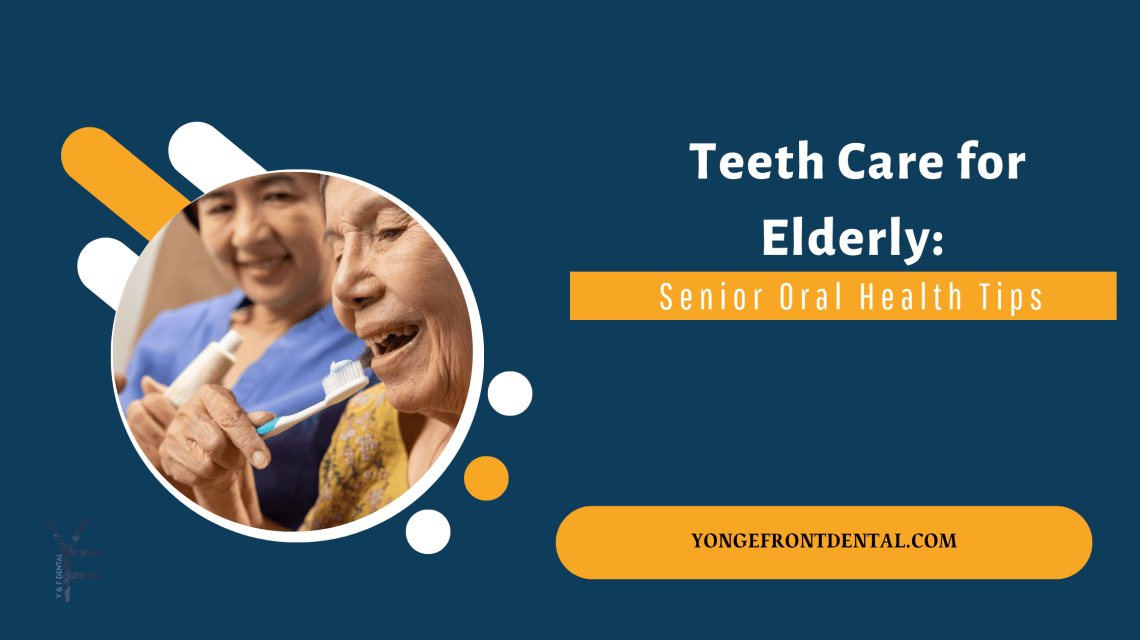As we age, our oral health needs undergo significant changes that require specialized attention and care. For seniors, maintaining proper dental health extends far beyond aesthetic concerns; it becomes a crucial component of overall wellness, affecting everything from nutrition and comfort to social confidence and quality of life. Recent studies from the Canadian Dental Association reveal that many seniors experience major dental issues, yet a concerning number don’t receive the specialized care their changing oral conditions demand.
Expert Teeth Care for Elderly and Seniors
This comprehensive guide delves into the unique oral health challenges that come with aging, offers practical daily care strategies, and highlights professional dental services that can make a meaningful difference. Whether you’re navigating your own senior dental journey or helping care for an elderly loved one, these expert insights will equip you with the knowledge needed to maintain healthy teeth and gums throughout the golden years.
Age-Related Oral Health Challenges
The natural aging process brings several changes to oral health that require special attention. Recognizing these common issues is the first step toward effective prevention and treatment:
Dry Mouth Complications
Dry mouth (xerostomia) affects nearly 30% of older adults, primarily due to medication side effects. Over 500 commonly prescribed medications can reduce saliva production, including those for hypertension, anxiety, and pain management. This reduction in saliva is particularly problematic because saliva:
- Neutralizes acids that cause tooth decay
- Helps prevent infection by controlling bacteria
- Aids in digestion by beginning the breakdown of food
- Makes speaking and swallowing comfortable
Without adequate saliva, seniors experience increased cavity rates, difficulties with dentures, and persistent discomfort. At Yonge and Front Dental, we can recommend specialized products and strategies to improve moisture levels and protect dental health.
Progressive Gum Disease
The Canadian Dental Association reports that nearly 70% of Canadians will develop some form of periodontal disease during their lifetime, with risk increasing substantially with age. For seniors, gum disease presents unique challenges:
Gum recession exposes sensitive root surfaces, creating new areas vulnerable to decay. The connective tissues supporting teeth naturally weaken over time, making gum disease potentially more aggressive in older adults. Chronic conditions like diabetes can further complicate gum health, creating a dangerous cycle where poor gum health makes diabetes harder to control, and poorly controlled diabetes worsens gum disease.
Early intervention is crucial, as advanced gum disease remains the leading cause of tooth loss among seniors. Our gentle periodontal treatments can help maintain healthy gums even when other health challenges are present.

Root Decay and Tooth Sensitivity
As gums naturally recede with age, tooth roots become exposed. Unlike the crown of the tooth, roots lack protective enamel, making them more susceptible to decay and sensitivity. Research indicates that seniors experience root decay at higher rates than any other age group.
This type of decay progresses rapidly and often occurs near existing dental work. Regular dental exams are essential for catching these issues early when they’re simpler and less expensive to address.
Oral Cancer Risk Factors
Oral cancer risk increases significantly with age, with most cases diagnosed in people over 65. Regular screenings are vital since early detection dramatically improves outcomes. Warning signs to watch for include:
- Persistent sores that don’t heal within two weeks
- Unusual lumps or thickening of cheek tissues
- White or red patches on gums, tongue, or mouth lining
- Difficulty chewing, swallowing, or moving the jaw/tongue
- Numbness in the mouth region
- Persistent sore throat or feeling that something is caught in the throat
At Yonge and Front Dental, comprehensive oral cancer screenings are a standard part of every senior check-up.
Daily Oral Hygiene Essentials for Seniors
Maintaining excellent day-to-day oral hygiene becomes even more critical as we age. Here’s how seniors can adapt their routines for optimal dental health:
Effective Brushing Techniques
For seniors, especially those with dexterity challenges, proper brushing technique requires some adaptation:
Choose a toothbrush with a larger handle for easier grip, or modify a regular toothbrush by placing it through a tennis ball to improve grasp. Electric toothbrushes can significantly reduce the physical effort needed while improving plaque removal by up to 21% compared to manual brushing.
Use a soft-bristled brush to protect sensitive gums and exposed roots. Smaller brush heads may be easier to maneuver around dental work or in hard-to-reach areas. Fluoride toothpaste specifically formulated for sensitivity can provide additional protection.
Aim to brush for a full two minutes, twice daily. If standing at the sink is difficult, try brushing while seated at a table with a bowl and glass of water.

Flossing Adaptations
Daily flossing remains essential for seniors, but physical limitations can make traditional flossing challenging:
Floss holders or floss picks can make the process much easier for those with arthritis or limited dexterity. Water flossers provide an excellent alternative, effectively cleaning between teeth and around bridges, implants, and other dental work. For very tight spaces between teeth, interdental brushes can be more effective and easier to manage than traditional floss.
Regardless of the method chosen, cleaning between teeth once daily removes plaque and food particles that brushing alone cannot reach.
Special Care for Dentures and Dental Appliances
For the many seniors who wear full or partial dentures, proper care is essential:
Remove and rinse dentures after eating to clear food particles. Clean your mouth after removing dentures, including brushing your natural teeth, tongue, cheeks, and the roof of your mouth. Brush dentures daily with a soft-bristled brush and nonabrasive denture cleanser.
Soak dentures overnight in approved soaking solutions to keep them moist and clean. Never use hot water for soaking, as it can warp the denture material. Have dentures checked annually for proper fit, as bone and gum ridges naturally change over time.
Nutrition and Diet for Healthy Aging Teeth
What seniors eat plays a crucial role in maintaining oral health. The right dietary choices can strengthen teeth, fight decay, and support overall mouth health:
Calcium-Rich Foods for Dental Strength
Maintaining adequate calcium intake is vital for preserving tooth structure and jawbone density. Excellent sources include:
Dairy products like cheese, which also helps neutralize mouth acids Calcium-fortified plant milks and juices Leafy greens such as kale and collards Canned fish with soft, edible bones like salmon and sardines
For seniors who have difficulty chewing harder foods, yogurt, smoothies with added calcium powder, and soft-cooked calcium-rich vegetables provide accessible alternatives.

Hydration and Saliva Production
Proper hydration is particularly important for seniors combating dry mouth:
Aim for at least 8 glasses of water daily unless medically restricted. Sugar-free hard candies and gums can stimulate saliva production between meals. Consider using a room humidifier, especially at night, to add moisture to the air and reduce dry mouth symptoms during sleep.
Avoid or limit alcohol, caffeine, and tobacco products, all of which can worsen dry mouth conditions.
Managing Sugar Intake Wisely
Sugar management becomes increasingly important as decay risk rises with age:
Read food labels carefully many seemingly healthy foods contain significant added sugars. Choose xylitol-sweetened products when possible, as xylitol actually helps prevent tooth decay. Be aware that many medications contain sugar, so request sugar-free alternatives when available.
After consuming carbohydrates or sugars, rinsing with water helps neutralize acids until you can brush properly.
Professional Dental Care Recommendations
Even with excellent home care, professional dental services remain essential for seniors. Here’s what to expect and seek out:
Frequency of Dental Visits
Most seniors should maintain a 3-4 month check-up schedule rather than the standard 6-month visits. This increased frequency allows for:
Early detection of root decay, which progresses much faster than crown decay Monitoring of existing dental work, which may need maintenance as it ages Regular professional cleanings to control plaque buildup, particularly important for those with dexterity issues Adjustments to dentures as mouth shape naturally changes over time
Specialized Services for Seniors at Yonge and Front Dental
Our Toronto practice offers several services specifically tailored to senior patients’ needs:
Comprehensive mobility accommodations, including wheelchair accessibility and chair transfer assistance Extended appointment options for those who need more time or frequent breaks Careful medication review to understand potential oral health interactions Specialized treatment approaches for patients with chronic conditions like diabetes, Parkinson’s, or arthritis
Our geriatric dental specialists understand not just the oral aspects of aging but how they interconnect with overall health and quality of life.

Supporting Seniors with Special Needs
For seniors with cognitive or physical challenges, dental care requires additional consideration and support:
Caregiving Assistance Techniques
For caregivers helping seniors with dental hygiene:
Establish a consistent routine with the same time, place, and steps each day. Use simple, clear instructions, demonstrating each step if needed. For patients with dementia, provide gentle reminders and reassurance throughout the process.
If resistance occurs, try again later rather than forcing cooperation. Sometimes a different approach or time of day works better.
Environmental Adaptations
Small changes to the bathroom environment can make oral care more accessible:
Install bright, non-glare lighting to improve visibility Use contrasting colors for dental care items (dark-colored toothbrush against a light countertop) Keep the number of visible items minimal to reduce confusion Consider adaptive equipment like suction toothbrushes for those with swallowing difficulties
Preventative Strategies for Long-term Dental Health
Prevention remains the most effective approach to dental care at any age, but especially for seniors:
Professional Preventative Treatments
Several in-office treatments can provide significant protection:
Professional-strength fluoride treatments create a substantially stronger protective layer than home products alone. Dental sealants can protect vulnerable root surfaces from decay. Silver Diamine Fluoride applications can help arrest decay in its early stages without invasive procedures.
For seniors with recurring decay issues, custom fluoride trays for home use may be recommended as part of a comprehensive prevention plan.
Technology Innovations in Senior Dental Care
Modern dental technology has created new possibilities for senior dental health:
Digital denture design allows for more precise fit and faster replacements if needed. Minimally invasive restoration techniques preserve more natural tooth structure. Intraoral cameras help patients better understand their oral conditions and necessary treatments.
These advancements make dental care more comfortable and effective for our senior patients at Yonge and Front Dental.
Taking the Next Step
Maintaining excellent oral health as we age requires awareness, adaptation, and regular professional care. At Yonge and Front Dental in Toronto, we’re committed to providing seniors with the specialized attention their changing dental needs require.
We invite you to schedule a comprehensive senior oral health assessment at our practice. Our team will evaluate your current dental status, review your medical history and medications and develop a personalized care plan that supports both your oral health and overall wellness.
Remember that investing in dental health during the senior years yields significant returns in comfort, nutrition, appearance, and quality of life. We’re here to support you through every step of that important journey.
Contact Yonge and Front Dental today at Call (+1) 416-364-2444 to schedule your appointment with our senior care specialists.


